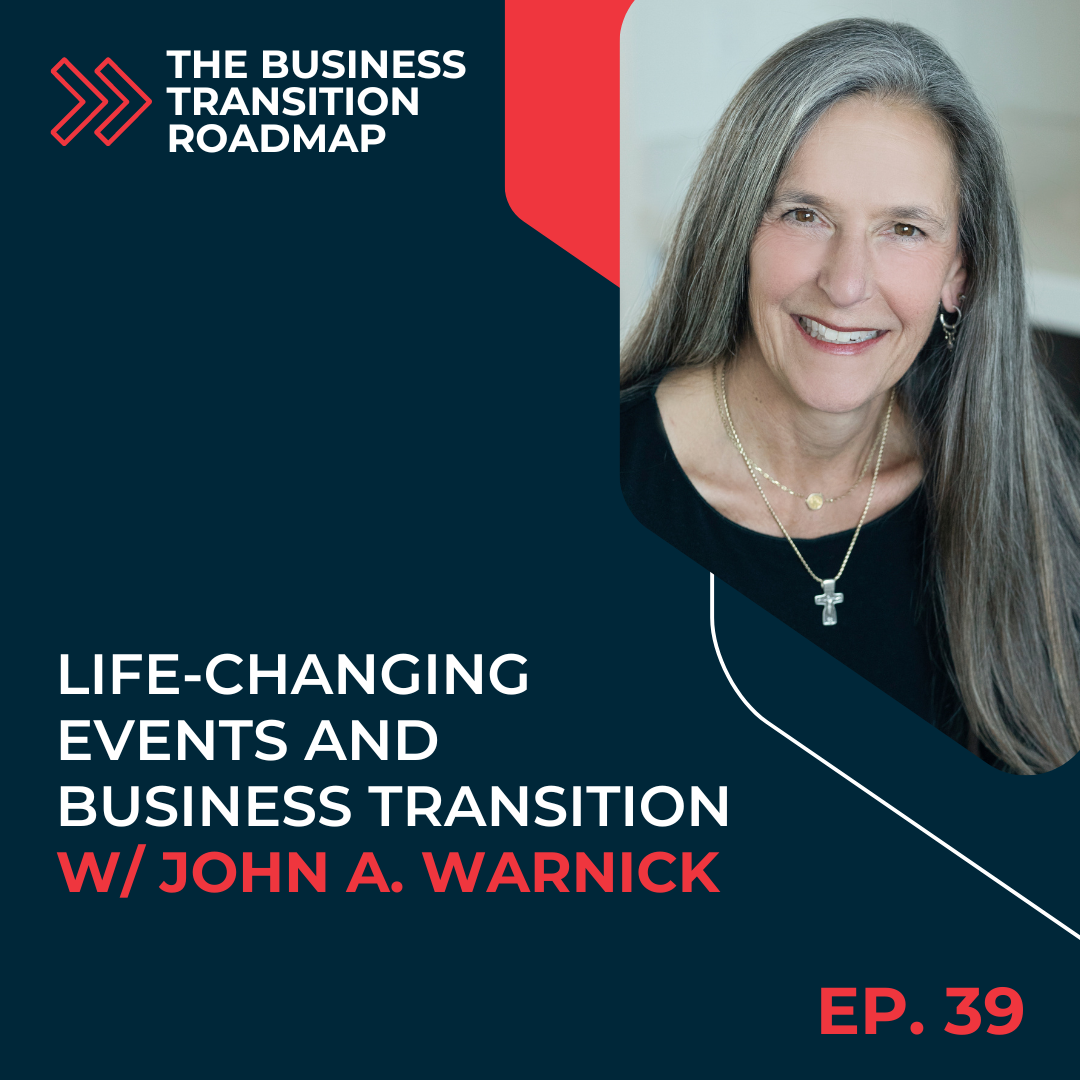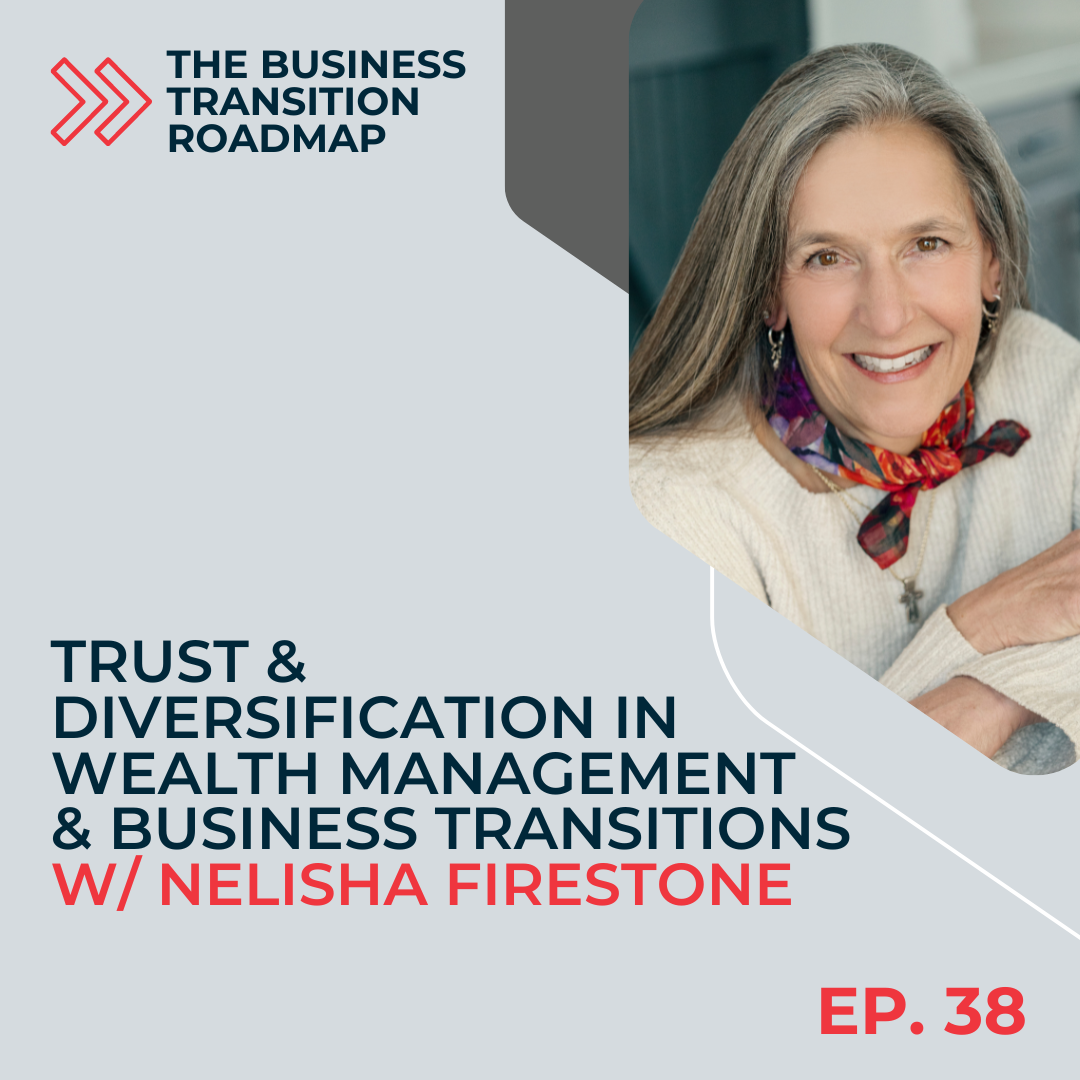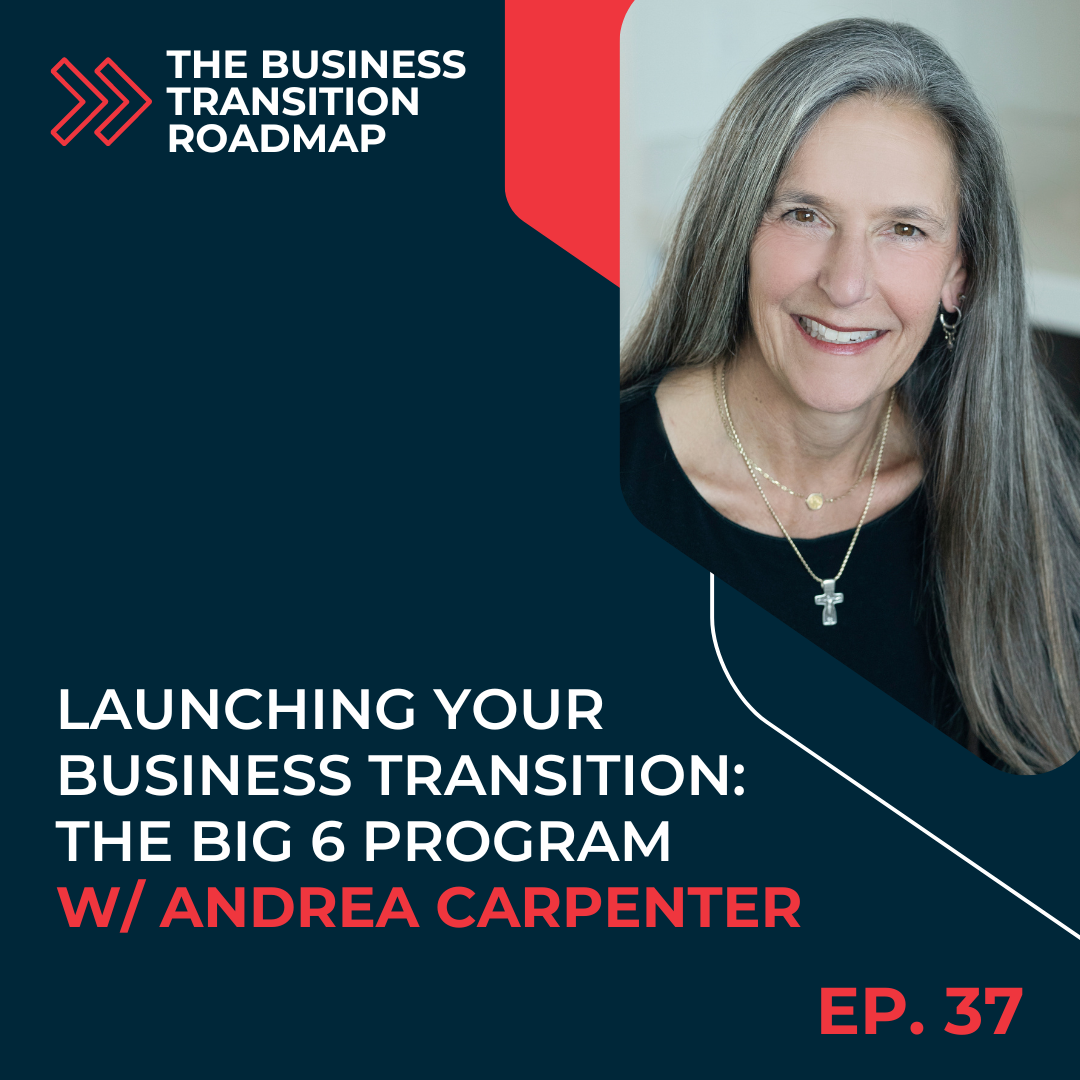Episode Description:
When it’s time to start the journey of succession, many owners get stuck on choosing their successor. They want to choose the right person, who will not only thrive in the business, but grow and expand it and carry it forward. This podcast episode, “Getting Stuck on the “Who” in Business Succession”, discusses key points why this happens. Tap or click the play button below to listen to: Getting Stuck on the “Who” in Business Succession.
The question of “who” in business succession is so essential and so complex that we can’t fit it all into just one episode. In this episode, we’re highlighting some important pieces of this topic before diving deeper into a series of episodes centered on choosing your “who”.
Connect with Elizabeth and the Transition Strategists:
Website: https://transitionstrategists.com/
Facebook: https://www.facebook.com/thetransitionstrategists
LinkedIn: https://www.linkedin.com/company/transitionstrategists/
This episode was produced by Story On Media & Marketing: https://www.successwithstories.com.
Getting Stuck on the “Who” in Business Succession Transcript
[00:00:00] Elizabeth Ledoux: Hi everyone and welcome back. Today what we’re gonna talk about is getting stuck with the WHO in business Succession. And this is such a big topic for business owners that what I am doing is putting this into kind of an overview highlight for this session. And then we’re gonna have six sessions that follow, that’ll be a series so that we can dive a little bit deeper into some ideas and thoughts about your who and um, why you get stuck and maybe how to get around some of that.
[00:00:37] So most owners get stuck with picking the who, the, their successor. Who is going to be the one who is going to be able to take this business on, carry it forward, take good care of it, and um, actually, hopefully the big. The big hope for a business owner, I think is for the business, not only just to thrive forward, but to even expand and grow and do more.
[00:01:05] And typically there are a lot of considerations when you’re trying to figure out who that one person is, who’s gonna be the leader in taking it forward. Because you have to have someone who is gonna be that leader, um, as the business moves. Otherwise, the business typically will tend. potentially be managed by a committee, which usually doesn’t work.
[00:01:27] And um, you know, you don’t wanna see it fail. So there are a lot of things to consider when you’re thinking about who is going to be that successor. Um, you’re thinking about skills, you’re thinking about, um, gosh, all kinds of skills, like, uh, financial skills. Do they have the financial background and knowledge to be able.
[00:01:52] to understand financials from a management level and run the business. Do they understand how strategy works? Do they understand how to put all of the components of the business together, kind of like an umbrella where they can manage and deal with it, and with finance and with marketing and with sales and with operations, and with hr, and all of the different components that go together.
[00:02:17] And those are all. that they may or may not have at this point. entrepreneurial characteristics, we need to figure those out. Uh, those are, some of them are inherited genetically, and I’ve got some statistics that I’ll share at another podcast that will tell you a little bit about what happens with that entrepreneurial, um, those entrepreneurial characteristics.
[00:02:43] So we’ve got learned and also inherited entrepreneurial characteristics. And some of them are things like, um, you know, being a self-starter and wanting to do that, that it’s okay to fall down and get back up. That they see things instead of seeing them as failures. Sometimes they see those things as opportunities.
[00:03:05] So where’s that opportunity? And they have the risk tolerance to continue and keep going. So we’re looking for entrepreneurial characteristics. We’re also looking for personalities. Answering the question, will your team, will this company and all these employees, um, vendors, customers, will they follow this person?
[00:03:26] Will they accept them as a leader and, and actually literally replace you? So they’re no longer looking to you. They’re looking to this new who this new successor. Need it to have, need them to have a fit in the culture. So are they gonna be able to carry the culture forward, treat people the way that you would like them to be treated, and also are you going to enjoy working with them?
[00:03:51] That’s a big deal because there’s a lot of teaching and a lot of training that goes on over this journey from when they start to where you actually transition out. . Equality and fairness is another piece, whether it is a company that has family members coming in, or whether it’s just employees inside of the business, that may be some of your, one of your successors or some of them.
[00:04:16] Um, you’re always thinking about equality and fairness. How are people gonna perceive maybe you having a favorite or having somebody who you believe. going to carry this forward better than another. So how do we deal with equality and fairness And, um, many people believe that equality and fairness comes from length of time within the business, that if somebody’s been there and been dedicated, that um, they should be considered.
[00:04:48] And we’ll talk a little bit about that in another podcast as well that can get you into a little bit of trouble no matter which way you. So the who is a very, very important question in what we call the big six. And the big six are six questions that you will have answered by the time you transition.
[00:05:09] You don’t have to have all of them answered right at the beginning. But you do need to have an idea of where you’re headed. That’s what we call our transition compass. So the big six are the why. Why do you wanna do this? The what? What do you have or want to transition? The who, which is huge. The when, which there are many whens, and then the how and the how much, and just as.
[00:05:34] a Note, we believe that starting with the four Ws is super helpful because if you start with the four Ws, the two Hs, they fall into place. If you start with the two Hs, typically you get lost because there are too many choices. You really need context to put the how and the how much around, and that comes from your why, your what, your who, and your when.
[00:06:00] So when you’re looking for. Potential successor, your who? Um, there is some different thinking that starts to happen. Most people think that, um, you can just look and see who’s been in your business and one of ’em should maybe bubble up or pop to the top. And that can be true, especially if you have a really great right hand person.
[00:06:23] Um, if you have a team though, that’s been built around, that really serves you and your personality, and your skillsets, and your makeup. Um, many times when you’re trying to replace yourself, you’re trying to find a, uh, a duplicate of yourself and that duplicate, uh, , that’s okay if you wanna find that duplicate.
[00:06:47] But typically, you’re not paying somebody to do exactly what you’re doing and to be exactly like you. So your team is built to support you, not to replace you. And many times, the team also, some of them don’t have that entrepreneurial characteristic. They don’t have some of the pieces that are required to really have the resilience.
[00:07:10] And also the vision of taking this company forward without you. So it’s a shift in thinking in what you’re actually looking for. And it’s also a shift in evaluating because instead of you being there to oversee what’s going on in the business and to guide and direct, um, you’re in envisioning in your own mind and your own heart truly.
[00:07:35] Um, how are you? , you’re envisioning these people actually taking over for you, and you’re no longer gonna be there to, to guide or direct at all. So you’re evaluating differently because you’re saying, can this person do it on their own? And would they carry on the legacy of this business and the traditions of this business?
[00:07:58] Um, just because that’s who they. , and that’s what they want and that’s how they operate. So in this shift of thinking, you’re evaluating differently so you can completely let go, and it’s helpful to actually understand that. The other thing that is gets owners stuck is not communicating or not figuring out what this potential successor wants.
[00:08:28] I can’t tell you how many times I’ve spoken with owners and they believe that they have this owner or this potential successor ready to go only to find out that they don’t. The successor, when they come in, they have to engage and engagement. Their engagement is key because imagine, again, the self-starter entrepreneur who comes in, builds and grows.
[00:08:54] The business has a. understands how you know finance works, can invest the money for a great roi, invest people’s time for a great r o roi. And keep this business going forward in a very healthy fashion. Um, that person has to want it. And I, in my notes I wrote down, want it with two or three exclamation points.
[00:09:16] They don’t have to kind of want it. They have to really, really want this business and really wanna be that leader and really want to take it over. That’s an interesting thing because when. in my last point when I was talking about, you know, shifting for what you’re looking for in a successor, this is part of the shift.
[00:09:39] You’re trying to figure out how you’re gonna get somebody who is, um, who wants it bad enough, who is quote unquote, um, maybe aggressive enough, not in a bad way, but in a very positive way to actually engage and take this thing on. And owners don’t like that. Owners don’t like being pushed or feeling like they’re being pushed.
[00:10:04] Owners don’t typically like being told what to do. Um, they’re, they’ve been that leader for a long time and they’re very happy having people help them and listen to those people, but not push them and not kind of push them out of the way. So as when we walk through some of these, , some of these just work that we do, and we build these roadmaps and then we start implementing them.
[00:10:31] The owners, the current owners, um, start feeling like they’re no longer important. They’re no longer wanted. They’re no longer needed. And that’s a, it’s an interesting thing that happens. I can tell you a little story about, it was a, it was a father and a daughter, and the father. wanted for this daughter to engage and wanted her to do this.
[00:10:59] And so we worked and worked and we got the daughter to say, okay, yeah. Um, it’s terrifying for me to take on this business. Um, at the time, her dad was an engineer and she was not an engineer and she didn’t know whether or not she could do the work. So, . She finally got to the point where she had a belief that she could take this on and she could do the work, and her dad was happy about that because, you know, she was engaging and gonna take over the business.
[00:11:28] And there was a point though, where her ideas got pretty big and she started to take on that role and she started to see what was possible. And this father. Was like, whoa, whoa, whoa, whoa, whoa. Let’s not build that. Let’s not invest this money. Let’s not do that. I’m harvesting my money when what she wanted to do is reinvest the money.
[00:11:52] She wanted to build it bigger. She wanted to go online. She saw the opportunity, so she saw the business as a. Not being as complete as he did. He thought it was done and complete and was doing really nicely. She was like, no, look at all this opportunity. Look at all this cool stuff. Look at how big we could be.
[00:12:10] We could go internationally. Wouldn’t that be fun? And the dad was like, oh my gosh. So. The idea of being pushed. And he did. He felt pushed because she wanted to do something and he was resistant to it. And as soon as he let go and as soon as they came to an agreement and that implementation really started to happen, she took over.
[00:12:35] Money got invested differently. There was plenty for him to harvest. And she was able to continue and help that business to thrive forward. But there is that piece of feeling like you’re being pushed and it’s very uncomfortable. So you’re looking for somebody who is going to almost challenge you, and then you have to be okay with that.
[00:12:58] So people, business owners get stuck in the WHO for their business transit. Pretty much every time. Um, even if it’s in the midst of it, there are always obstacles to overcome and go around and what you’re looking for. There’s a difference and a shift in your thinking, in your, in how you’re approaching it different than how you ran the business.
[00:13:22] So what got you here probably won’t get you there. So I’d like for you to reflect just internally in your heart and your mind. What about your, who is getting you stuck, and I’d like you to do that. And then next time we’ll dive into the six part series. So I’ll look forward to seeing you then.
The Business Transition Roadmap with Elizabeth Ledoux
How do communities thrive? When businesses experience healthy growth and transition. Join CEO of The Transition Strategists, Elizabeth Ledoux as she and her guests identify what makes a successful business transition roadmap. If you know you want to transition or exit your business “one day”, today is the right day to start planning. This show will give you the roadmap.




